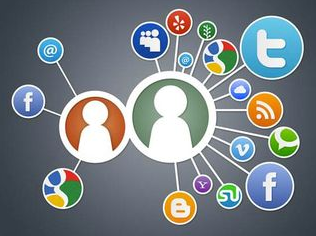This page is meant to guide you on how to navigate copyright and Terms of Service as they relate to social media and using and reusing content on social media.
Social Media and Copyright
Social Media & Copyright
![]()
If you use social media, you are likely interacting with copyrighted content on a daily basis, and thus, you are a user of copyrighted content. Consider whether you are sharing content within the platform where you found it. Ask yourself "Is there a license that covers my use?" In this case, there is. Users of social media platforms agree to the terms and conditions, and thus, they are agreeing to a license to allow other users to share their content, but most likely within that platform. If you simply selected "share" or "retweet," you are probably okay, but if you copy/pasted content and shared it outside the platform, now you will need to evaluate "Is there an exemption in U.S. copyright law that covers my use?" The most commonly used exemption is fair use.
Social Media & Complying with Intellectual Property Laws
The Facebook Terms of Service are one example of a license that specifies that others can share others' content on Facebook, such as posts and profile information. If you found the content on Facebook, or another social media platform, simply selecting "share" falls within the terms of the license, and you generally do not have to worry about copyright infringement issues. However, if you access content on a platform and share it with others outside the platform, you would likely have to either rely on an exemption in the law, such as fair use, or seek permission to legally reuse that content. For example, if you want to take content someone shared on Facebook and use it in another context, such as on your website or in your academic work, you should treat it as you would treat content you would find in any location, digital or physical. Refer to the guidelines in the additional areas of this guide on how to legally reuse others' content. Generally, if you can find similar content that is either in the public domain or has a Creative Commons License (CCL), this is the recommended route to take when reusing others' content. Keep in mind that the law does not treat digital copyright infringement any differently than physical copyright infringement. Thus, it is important that you make careful evaluations of your uses. If you are using trademarked logos and images, especially outside the social media platform, please review information on Trademarks & Fair Use.
Social Media Platforms that Permit Sharing or Embedding Outside the Platform
YouTube, Giphy, and Vimeo are probably the most well-known social media platforms that allow sharing outside their platforms. Each license agreement is slightly different, but basically these platforms allow others to share the content outside their platforms. For example, YouTube states that you "grant each user of the Service a non-exclusive license" to user your content "as permitted through the functionality of the Service." This means that YouTube videos can be embedded in other locations, so long as they remain in the YouTube Embedded Player. If, however, you decide to download or record content from YouTube, or a platform with a similar license agreement, you will likely now have to determine if your use falls under an exemption in the law, such as fair use, or if you need to seek permission for your particular use.
Social Media & Privacy
Privacy Circles Image by Bernard Goldbach, CC-BY
Privacy is a separate issue from copyright, but it is a crucial subject to understand in our digital age. In short, anything you post online, even if you have strict privacy settings, is still publicly available to others in some form or other.Therefore, you should treat social media and other online sources. Privacy will not be covered in-depth on this page, but here are resources where you can learn more about protecting your privacy on social media.
How to Manage Your Social Media Privacy Settings
This resource outlines steps that might help keep your most sensitive information safe on social media sites. Use these steps to help protect yourself and your loved ones online. It covers Facebook, Twitter, Instagram, SnapChat, LinkedIn, YouTube, and Pinterest.
Choose Privacy
The links on this page offer tips for protecting your privacy online (social media, personal computing devices, email, etc.) at home and on the job.
Social Media Security Guide
A guide from UCLA's Information Security Office on how to best protect yourself online.



